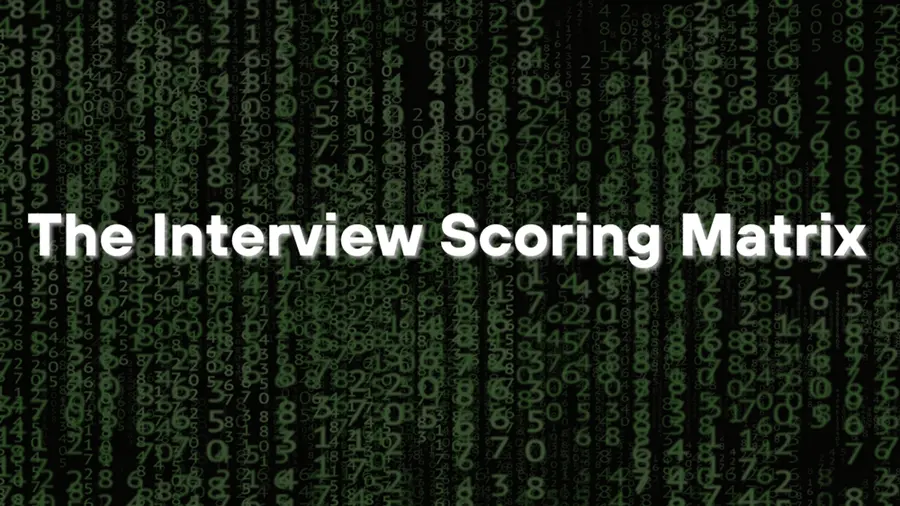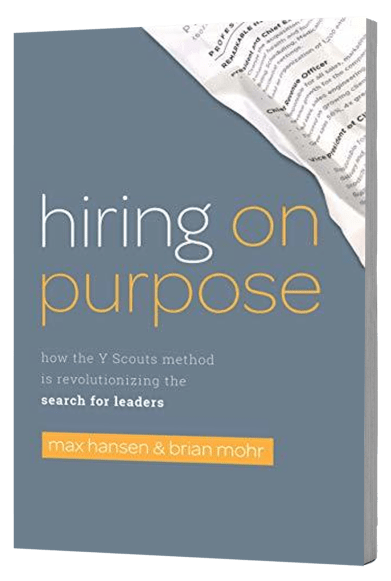You know what’s scarier than a horror movie? Conducting job interviews without a clue on how to score candidates. Sadly, that’s the reality for many companies.
Hiring the wrong person can turn into a nightmare for a company, with lost time, money, and productivity. And relying on “gut feeling” instead of a systematized process? That’s like playing Russian roulette with your hiring decisions.
But don’t worry, we’ve got a solution that will make your hiring process less of a horror flick.
We recommend using an “Interview Scoring Matrix” to objectively evaluate candidates and ensure you’re making the best choice.
We’re not talking about a mystical, complicated process here. In fact, an Interview Scoring Matrix is pretty straightforward.
Table of Contents
ToggleIn this article, we’ll discuss:
- What an Interview Scoring Matrix even is?
- How to measure success outcomes during an interview (hint: 90% of companies fail to do this)
- The importance of evaluating a candidate’s ability to drive results (and how to avoid hiring someone who talks the talk but can’t walk the walk)
- The role of leadership and people development in hiring for important positions (because you don’t want to hire someone who’s a toxic leader)
- How to assess a candidate’s learning mindset (because who wants to hire someone who refuses to learn and grow?)
By the end of this article, you’ll be armed with practical tips and a cool new tool to make hiring decisions that won’t haunt you in the future.
Let’s get into it.
What The Heck Is An Interview Scoring Matrix?
An Interview Scoring Matrix is like a cheat sheet for evaluating job candidates. It’s a standardized tool that helps interviewers assess candidates objectively based on a set of criteria and a rating scale.
This makes it easier to compare apples to apples and avoid the temptation to rely on gut feelings (which, let’s be honest, can be about as reliable as a Magic 8 Ball). Plus, an interview scoring matrix helps keep interviewers focused on what’s important for the role and the company, so you can make informed hiring decisions that align with your goals and values.
At Y Scouts, we set up our Interview Scoring Matrix to include:
-The three core success outcomes for the specific role
-History of driving results
-History of developing others
-History of learning relentlessly
Now You Know What It Is…But How Do You Use It?
We take scoring candidates seriously at Y Scouts, but that doesn’t mean we don’t have fun with it. Each stakeholder involved in the interview process gets to play judge and rate candidates on a scale of 1-5 for the categories that matter most. It’s like a talent show, but without the cheesy music and sequined costumes (unless that’s your thing, of course).
After all the interviews are done and the scores are tallied, we’ve got ourselves a blueprint for success that’s as clear as day. No more second-guessing or relying on gut instincts…just hard data and a sprinkle of Y Scouts magic. And when it’s time for the internal discussion, we’ve got all the ammo we need to make informed decisions that align with our goals and values. It’s like the Avengers assembling, but instead of saving the world, we’re building kickass teams.
How To Measure Success Outcomes
If you want to hire a successful candidate, you need to define what success looks like first.
Step 1: Define three specific success outcomes for the role (this should be done BEFORE you ever start the interview process)
Step 2: Ask the candidate about their past achievements related to each success outcome. The candidate needs to prove they’ve accomplished each success outcome in the past. Avoid the fluff and vanity metrics.
Step 3: Score each success outcome in its own column.
Follow these steps, and you are already doing better than 90% of the companies out there.
But if you want to really level up your interviewing process, you’ll want to discover more than just the ability to achieve these success outcomes.
Can The Candidate Drive Results?
Let’s face it, anyone can talk the talk during an interview. But can they actually walk the walk once they’re on the job? That’s why it’s vital to evaluate a candidate’s ability to drive results before making a hiring decision.
To separate the true achievers from the imposters, ask for concrete examples of how the candidate has delivered results in their past roles. Did they increase revenue, save costs, or boost productivity? And most importantly, what was their role in achieving those results? By digging deep and evaluating a candidate’s track record of success, you can ensure that you’re hiring someone who can actually deliver the goods.
Give this column a score of 1-5.
When Has The Candidate Developed Others?
When hiring for important positions, it’s important to find someone who not only has the right skills and experience but who can also inspire and develop their team. Think of it like finding a coach who can take a benchwarmer and turn them into a star player.
To assess a candidate’s leadership abilities, look for evidence of their ability to build strong, positive relationships with colleagues and team members. Do they have experience in coaching and mentoring others? Have they helped team members grow and develop professionally?
Give this column a score of 1-5.
Does The Candidate Have A History of Learning Relentlessly?
We’ve all been in the room with a “know-it-all” who won’t let you get a word in edgewise or hear another point of view. And ain’t nobody got time for that in your business. Assessing a candidate’s learning mindset is crucial because you want someone who’s always eager to grow and adapt.
One way to do this is to ask about the last time they learned something new and how they went about it. Look for candidates who take initiative in their own learning, seek out feedback, and are open to trying new things. Remember, a candidate who’s not willing to learn is a candidate who’s not willing to grow, and that’s a recipe for disaster.
Give this column a score of 1-5.
Tally Up The Scores
Once all interviews are completed, it’s time to bring everyone together and tally up those scores. And with the Interview Scoring Matrix, you’re not just crunching numbers, you’re opening the door for some good old-fashioned debate.
If Sally thinks Candidate A is a “5” for Developing others, but Bobby thinks they’re just a “2” in that category, it’s time to put on the gloves and duke it out.
Not literally of course…but these scores to compare notes, share insights, and get to the bottom of any discrepancies.
By the end of the meeting, you’ll have it all hashed out, you’ll be aligned on your decision-making framework, and by golly you just found your next superstar hire.
That’s A Wrap
Well, there you have it. Don’t let the simplicity of the Interview Scoring Matrix fool you – it’s a powerful tool that can take your interviewing process from guesswork to data-driven decision making.
By using this matrix to evaluate candidates, you’ll have a solid foundation for making hiring decisions that are based on facts, not just a “gut feeling.” And the best part? It opens up the opportunity for constructive discussions within your team about the right fit for the role.
Here’s a copy of our Interview Scoring Matrix you can clone and use in your business.
So go ahead and give it a try with your next hiring role – we promise it’ll be worth it.
Good luck, and happy hiring!





